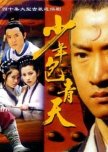
Don’t expect this show to be anything like Jin Chao Qun’s Judge Bao. This young version of Bao Zheng is not a judge, but more of a snoopy detective. Each case is like an Agatha Christie’s “whodunnit” with a lineup of suspects and twists designed to keep you guessing. I wish the writers are more creative in setting up the mysteries, though. After the second case, most people can spot the pattern and figure out who the murderers are.
Zhou Jie is an actor who puts 110% into understanding his character, even if he tends to overact at times. His Bao Zheng is goofy and even a little sly, but has enough conviction and gravitas to show how he would grow to become a Chinese symbol of justice. Like him or hate him, the series would not be the same without Zhou Jie’s talents.
The show has a great ensemble cast in Ren Quan, Li Bing Bing, Shi Xiao Long, and Liu Yi Jun. Their bantering and teasing of each other feel very warm and natural. You can’t help but smile. It’s like watching a bunch of sibling bicker, except for some flirting between the Zhou Jie-Li Bing Bing and Ren Quan-Liu Yi Jun coupledom.
Finally, a shout out to Chen Dao Ming as the 8th Prince. This man oozes shrewdness. He looks totally relaxed and bored, but you can tell that nothing escapes his notice. He steals every scene he's in. When it comes to acting, Chen Dao Ming is in a league of his own.
Was this review helpful to you?
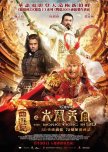
The Monkey King 1: Havoc In Heaven's Palace
0 people found this review helpful
As a fantasy, it failed spectacularly. It failed to be an immersive experience. The celestial palaces, the demon’s lair, and Hua Guo Mountain looked more like backdrops. You didn’t feel like to you could step through the screen and into this world. The problem was with the poor designs, not the CGIs itself. I’ve seen movies/series with low-tech effects that still managed to make it work.
They hired very capable actors, but all of the performances felt very superficial. I totally blame this on the directing. Casting Donnie Yen as Sun Wu Kong was pointless, since he didn’t really get to show off his fighting skills and choreography. Maybe this was why they replaced him with Aaron Kwok in the sequel.
I will end this review on a positive note. This was a high budget production with great looking actors.
Was this review helpful to you?
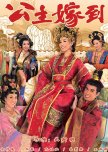
Kam Duo Lok was not your typical male lead. He was neither smart nor brave. He was not a talented scholar, a great martial artist, or even a shrewd businessman. Actually, he was kind of a bum, though one that was lucky enough to be born into a rich family. He won’t stand up for himself, but he was willing to stand up for others when no one else would. His heart was in the right place and that was how he won over his princess. Moses Chan always has comedic chops and was a good fit for this role. His most memorable moment was when he led his brothers-in-law in protest against their abusive wives. He fearlessly roasted his own wife, her sisters, and even his father-in-law, the emperor himself. Moses looked like he was having a blast with this scene. Too bad the script didn’t give him much else to work with.
Unlike Moses, Charmaine Sheh was still a little self-conscious in her acting. She seemed all too aware that she had to look pretty, even in the scenes that required her to look silly. The supporting cast wasn’t bad, mostly because you’re not supposed to take any of them seriously. As a comedy, it was amusing enough but not laugh-out-loud funny. They needed to have more “straight man” characters to make the jokes work.
A lot of work went into the making the costumes look rich and luxurious. Too bad the crew went overboard with it. Some of the colors clashed and the wigs were past the point of ludicrous. There were so much jewelry and ornaments, but they looked as cheap as the stuff you see at the night markets. The thick war paint didn’t do anyone any favors, either, especially Charmaine, who was most radiant in simple hairstyles and light makeup. The makeup here made her look like she was in drag.
I like the Charmaine-Moses partnership since “Beyond the Realm of Conscience.” They seemed very comfortable with each other. Too bad TVB didn’t give them a better vehicle to showcase their talents.
Was this review helpful to you?
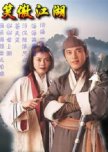
Even the most diehard fans can’t deny that this was a low budget production. The fight scenes and special effects were sloppy, given that TVB invested a lot more in “Journey to the West” which aired in the same year. The costumes were cheaply made and ill-fitted. The glue on the actors’ wigs were peeling off. The makeup was so bad you can actually see the pores on people’s faces.
You could ignore these flaws, if you watch it for Jacky Lui. He was, and still is to this day, Linghu Chong. It was as if the character jumped out from the pages of Jin Yong’s novel. You see it in Jacky’s expressions, the way he talked, and even in his swagger. Linghu Chong had a devil-may-care attitude that was comical, bordering on disrespectful. Underneath all that was a thoughtful and sensitive man. Jacky was one actor who could show all the facets of this character. It looked like he was having fun with the dialogues, which were witty and true to the book.
The other highlight of this series was its gallery of villains, each with his/her own distinctive style. Timmy Ho had a boyish smile that can easily turn into an ugly sneer. You get to decide for yourself if his Lin Ping Zhi was truly rotten or just a pitiful victim driven to the dark side by his enemies. Chan Hung Lit looked exactly like the sly old fox that was Zuo Lengshan. Law Lok Lam added a caring, fatherly side to the bloodthirsty Ren Wo Xing. Wong Wai, who can play both a good and bad guy with ease, was the ideal choice for Yue Bu Qun. His acting was so finely tuned here, especially his facial tics and subtle shifts in manner.
Last but not least, there was Dong Fang Bu Bai. He had very little screen time but was a looming presence throughout the series. Nowadays, it’s politically incorrect to call him a monster, but that was what Jin Yong intended him to be. The scariest monster was one that was a warped, twisted version of ourselves. It showed us what we are capable of becoming. Lo Chun Shun didn’t get nearly enough recognition for his work. His Dong Fang Bu Bai was one of the most iconic bad guys of the wuxia genre.
This story marked the start of Jin Yong’s transition away from the conventional hero and villain. In a way, it was a literary milestone. The screenwriters did right by staying faithful to it. They did add extra scenes to develop the characters. Some of it was good (Ren Wo Xing’s backstory), some of it not so good (Yue Ling Shan’s despair over Lin Ping Zhi). I like the added subplot for Linghu Chong and Ren Ying Ying, even if it came a little too close to “Romeo and Juliet.” It was nice to have that light touch of romance after so much violence and death.
Was this review helpful to you?
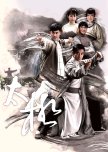
It was smart of the writers to incorporate tai chi philosophy into the development of the main character, Mo Ma. Other than that, the plot was pretty generic, recycled from parts of older TVB series. This is usually ok, if there’s actually good acting to make up for it.
Vincent was a surprisingly capable actor. He had an expressive face and was especially effective at the hurt puppy dog look. I think he once said he liked playing a romantic hero, and it showed in the yearning way his Mo Ma looked at Melissa Ng’s Song Ching. Sadly, Melissa was out of her range here. Her porcelain doll face was perfect for those elegant ice queen roles, but she was missing the warmth of a homespun country girl. The bad hair style didn’t help her, either. She basically killed any chemistry there might have been with Vincent. All their scenes together were boring.
Raymond Lam had both the good looks and the acting chops to play Hiu Sing, the golden boy who fell from grace but managed to redeem himself later. These type of roles were tricky in that he had to be pathetic, yet still likeable. You will feel for Siu Hing over many things, except his obsession with Myolie’s Chi Kwai. Now this woman had to be the most selfish, unreasonable, self-entitled brat. Worse, people around her enabled her dysfunctional and destructive behavior. She acted like Mo Ma belonged to her, although it was clear he couldn’t care less. She did eventually fall for Siu Hing and changed near the end. But it was all very abrupt and way too convenient. By that time, I was so sick and tired of Chi Kwai that I just threw up my hands and said “whatever.”
Derek Kwok looked cool here as a villain with a heart. In fact, many of the veteran actors brought their A game. It was the actresses who let the story down.
Watch this only if you’re an avid action/martial arts fan, or if you want to see fight scenes done right.
Was this review helpful to you?
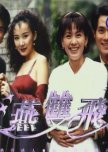
This review may contain spoilers
It's nice to watch a series that makes you sad, not angry. There are no villains here, just people with a lot of emotional baggage trying to figure out their own lives. The story is sweet and bittersweet. Just get your boxes of tissues ready. And maybe some hot tea, too.These days we don’t often see a love quite like that of Chengyan and Zhan Yin. Both were somewhat mentally-disabled, but they were the most charming dimwits ever. They were simple to the point of almost childlike, so their families felt the need to protect these two lovebirds from themselves. This interference ultimately led to tragedy. Stephanie Hsiao and Jonathan Chen played off each other really well. They can’t seem to keep their hands off each other, so much so that I wondered if they were dating in real life.
Sunny Tu was actually very pretty, but they made her Kaiyan so matronly that she looked like Chengyan’s mother instead of her twin. Her hair and outfits were very unflattering. Her looks mismatched with Louis Lin, who was painfully stiff and awkward here. There was supposed to be a romantic tension between the two, but it seemed like Louis and Sunny were trying their best to avoid having to touch each other.
Shi Yu was such an underrated actor. His Tianwen could’ve been so much more if the writers gave him a chance. On the outside, he seemed silly and superficial, until the scene where he was holding Chengyan’s baby and a single silent tear slid down his cheek. In that one moment you understand the depth of his feelings for Chengyan, even though he never said it out loud. That alone was the most unexpectedly touching scene, and Shi Yu hit just the right note without overdoing it. It was simple but more moving than watching Zhan Yin rolling on the ground and crying his eyes out.
The mood of this series is perfectly captured by its wistful theme song, ‘Red Bean’ by the legendary Faye Wong. It reminds you that everything has an end, and neither meeting nor parting is forever. Tissue, please.
Was this review helpful to you?
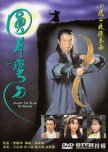
At the time, Louis Koo was so famous as Yang Guo (Return of the Condor Heroes) that many people overlooked how good he was in this series. Ding Pang was a much darker and more complicated character. In the hands of a lesser actor, you would hate this power-hungry man. But Louis had the charisma and the depth to make you feel sorry for Ding Pang, even though you might hate the things he did. Noel Leung, with her beautiful sad eyes, was the perfect Ching Ching. I can see why Ding Pang could never quite let her go. Irene Wan and Eddie Cheung were in their elements as a seductress and a scoundrel, respectively. The younger actors were weak, but not bad enough to drag the series down.
The fight choreography was typical of its time, nothing too fancy or exciting. I still prefer this to some modern kung fu series where they just flail their arms and let the special effects department do the work.
Was this review helpful to you?
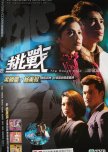
This is where you can see the youthful Tony Leung, before he became the superstar he is now. Tony’s strength as an actor is that he fully grasps whatever character he’s playing and carry it all the way through. He played Kim Hung as kind-hearted, earnest, endearing, and naive to fault. He was slightly overshadowed by Ray Lui’s performance. Ray’s Tin Wai had more ups and downs, therefore more layers to him.
Bik Wah was Barbara Yung in her last starring role. She was simply glowing in here. She excelled at playing feisty and cute characters, bordering on being an unreasonable brat. As a viewer, I forgave her because Kim Hung forgave her. He was very much in love, but not a pushover.
Money Chan (aka Barbara Chan) was also very pretty here. Her icy looks were a sharp contrast to Bik Wah’s fiery personality. She and Ray have excellent chemistry, and their scenes together were intense. Lau Dan and Ha Yu have a good dynamic as Kim Hung’s two dads. Unfortunately, their bickering dragged out for way too long and did nothing to move the story forward. I kept waiting for them to patch things up and learn to appreciate one another. That moment never really came, so it was more or less unresolved.
Special mention for the late Herman Kwan as the powerful chairman and family patriarch. He was rich in money, but poor in just about everything else in life. His final scenes were just heart-breaking. It took a veteran actor to pull it off without making it hammy.
Thumbs up to the crew for the beautiful camera work. They captured the feel of Hong Kong and Kowloon with shots of brooding streetlamps, long lonely corridors, and misty view of skyscrapers from the mountain top. No green screens or CGIs, just hidden urban beauty that is always there if people only stop to look.
This drama has one of the best theme songs, made more beautiful by Anita Mui’s haunting voice.
Was this review helpful to you?
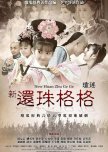
This review may contain spoilers
I love sappy, idealized romance as much as the next girl. My standard for these types of series isn’t high. I only ask for likeable characters that I can root for. Too bad this show can’t deliver on that. The leading lady, Xiaoyanzi, is immature and obnoxious. When she doesn’t get her way, she yells, stomps, and throws tantrums. The men, pushover as they are, go out of their way to wheedle and plead for her forgiveness over every tiny little thing. It’s supposed to be cute and funny, but it's just ugly to watch. Her life choice is questionable, too. She grew up an orphan and genuinely longs for a father figure. But somehow, she’s perfectly ok with an arrangement that involves separating a baby from his father, possibly forever. Xiaoyanzi is so unpleasant that it’s hard to fairly judge Li Sheng’s acting.
Hai Lu has the opposite problem. She is given a very nice role of Ziwei, who is pretty much a saint. Yet her acting is one note, in that she looks perpetually sad. Even when smiling she looks on the verge of tears. Ziwei is just one depressed-looking girl from beginning to end.
Zhao Li Ying as Qing Er is absolutely charming, until they ruin her character. She’s a favorite of the Empress Dowager, as they share a special bond. Yet she runs off with Xiao Jian without even a backward glance. She doesn’t seem to miss this lonely elderly lady who worries about her and misses her dearly. When asked to come back to the palace and say goodbye, Qing Er says something like she doesn’t need to because the Empress Dowager has other grandchildren to keep her company. That’s a heartless thing to say about someone who loves you as her own granddaughter. Qing Er comes off as boy crazy at best, and cold-hearted at worst.
Most of the men aren't too bad. I give them props for delivering the cheesiest lines with the greatest of convictions (and a straight face.) I like the addition of Benjamin, just because it portrays a Caucasian guy as a real person and not some western stereotype for once. The worst has to be Zhang Rui as Wu A Ge. His acting is hammy and he has this skulking expression whenever he gets jealous. Wu A Ge does some really dumb things and wins both awards for Worst Father of the Year and Worst Son of the Year.
The series has a lot of good things going for it: beautiful people, idyllic sceneries, lovely costumes, and plenty of romantic scenes so sweet they will make your teeth ache. I don’t mind the anachronisms and the overuse of kissing scenes. But without good characters and story, this just feels empty.
Was this review helpful to you?
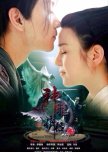
The screenwriters gave too many side characters their own romance. We're talking about the Five Greats and villains like Li Mo Chou. Even Gongsun Zhi and his wife got their time in the spotlight. Dugu Qiu Bai, who was not even in the novel, appeared in a long flashback with a girlfriend, too. These relationships were so stale and badly-directed that even a romance junkie like me felt tired. The plot was so cluttered that the main couple, Yang Guo and Xiao Long Nu, barely made an impression.
In the novel, Li Mo Chou often pondered, "ask the world, what is love?" My answer: not this drivel I'm watching.
Was this review helpful to you?







